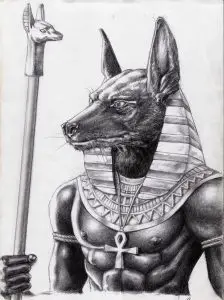Anubis was the Jackel-god of mummification. He assisted in the rites by which a dead man was admitted into the underworld. Anubis was worshipped as the inventor of embalming and who embalmed the dead of Osiris, thereby helping to preserve him that he might live again.

Anubis is portrayed as a man with the head of a Jackel holding the divine scepter carried by kings and gods; as simply a black Jackel, or as a dog accompanying Isis. His symbol was a black and white ox-hide splattered with blood and hanging from a pole, the meaning of which is unknown.
Anubis had Three Important Functions:
He supervised the embalming of bodies, he received the mummy into the tomb and performed the Opening of the Mouth ceremony and then conducted the soul into the field of Celestial Offerings. Most importantly though, Anubis monitored the scales of Truth to protect the dead from deception and eternal death.
Early in Egyptian history, Anubis (Jackel-god of mummification) was a god of the Dead. His role was later usurped by Osiris as he rose in popularity.
The god of embalming is probably associated with the Jackel due to the habits of Jackels to lurk about tombs and graves. It is only natural therefore that a god of mummification would be connected with them. By worshipping Anubis, the Egyptians hoped to invoke him to protect their deceased from Jackels, and later, the natural decay that unprotected bodies endure.
Anubis was the son of Nephthys, and his father was Osiris. One myth says Nephthys got Osiris drunk and the resultant seduction brought forth Anubis. Yet another says she disguised herself as Isis and seduced Osiris, and subsequently gave birth to Anubis.
Prayers to Anubis (Anubis God Of Ancient) are found carved on the most ancient tombs in Egypt, and his duties were many.
There is a variant of Anubis called Hermanubis, which is a combination of the Greek God Hermes and Anubis. As their functions as psychopomps are similar, they were combined by the Greeks into a single form. Hermanubis also appears in the alchemical and hermetical literature of the Middle Ages and Renaissance.
The other names of Anubis are Anpu, Inpu, Inepw, and Imeut, etc.